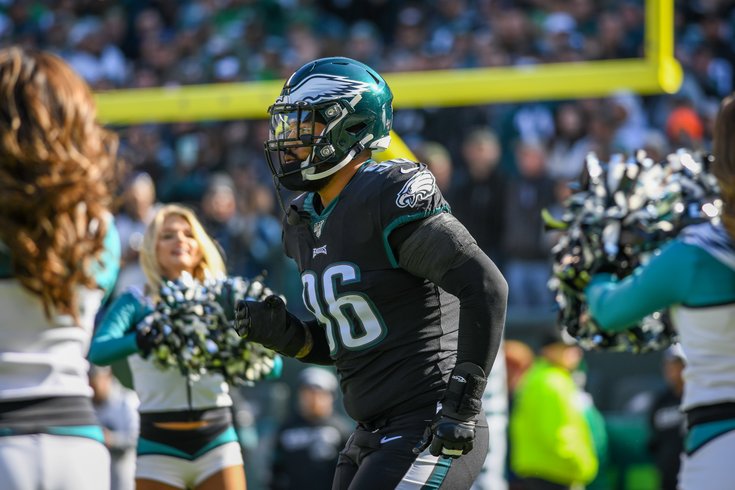
February 15, 2020
 Kate Frese/for PhillyVoice
Kate Frese/for PhillyVoice
Derek Barnett during the Philadelphia Eagles game against the Chicago Bears at Lincoln Financial Field in Philadelphia on November 3, 2019.
One of the decisions that the Philadelphia Eagles will have to make this offseason is whether or not to exercise their fifth-year option on defensive end Derek Barnett, like they did last offseason with Carson Wentz, and with Nelson Agholor in 2018.
That decision will be easy. Barring some unlikely contract extension – or, if, like, Barnett poops on the hood of Jeffrey Lurie’s car or something – the Eagles are going to exercise that option.
Barnett is an interesting player to debate. Many fans are down on him, which is understandable, given the following:
On the other hand, Barnett has made his share of huge plays in big moments, and the coaching staff loves him. They praise Barnett any chance they get, often citing his toughness and work ethic. In my view, while the numbers aren't there, I do think that Barnett has improved his repertoire of pass rush moves, and believe that he is a prime breakout candidate in 2020. We'll see. ¯\_(ツ)_/¯
But as far as exercising his fifth-year option, there isn't much of a downside to it.
Players drafted in the first round who have completed their third year in the league are eligible to have a fifth year added onto their contract by their team.
It isn't cheap. For players drafted in the top 10, the cost of the fifth year is the average of the top 10 salaries in the NFL at that player's position in the fourth year of their contracts. For players drafted anywhere in the range of 11th to 32nd overall, it is the average of the third-highest paid player to the 25th-highest paid player at that player's position in the fourth year of their contracts.
In 2017, Barnett was drafted 14th overall, so he would fall into the latter bucket. Last offseason, the cost for exercising a fifth-year option for a defensive end in the 11-32 range of the 2016 draft class was $9,451,000. That will likely rise a bit this offseason for the 2017 first-round draftees.
One important caveat to note is that the fifth-year salary does not become fully guaranteed until the first day of the new league year in the player's fifth year (in Barnett's case, sometime in March of 2021). It is fully guaranteed for injury, however. As in, if say, a player tore his ACL late in his fourth season, that fifth-year option would become fully guaranteed.
Got it? Yes? No? Well, anyway, moving past the nerd stuff...
I mean, yes, I just said they should, but I'll explain further.
You may be asking, "Will Barnett be worth around $10 million in 2021? Is he really worth the average of the third- to 25th-highest salary in the NFL at the defensive position?" To be determined, but that's not the way to look at it.
The benefit is that the Eagles would keep him under their control for an added year, and with Barnett having finished his third year in the league, the Eagles would be eligible to negotiate a contract extension at a time when his long-term cost could be reasonable, should Barnett be open to an early extension.
The only real risk the fifth year option presents is if Barnett either regresses or stagnates, and then also sustains a serious injury during the 2020 season that would carry over into the beginning of 2021. Without the injury, they could simply release him prior to March of 2021, and would not be on the hook for the fifth-year option at all. With such an injury, they'd be on the hook for the $10-ish million.
But certainly, the benefit of keeping Barnett under the Eagles' control for the added year outweighs the risk of a precipitous drop-off in play, plus a devastating injury.
Follow Jimmy & PhillyVoice on Twitter: @JimmyKempski | @thePhillyVoice
Like us on Facebook: PhillyVoice Sports
Add Jimmy's RSS feed to your feed reader